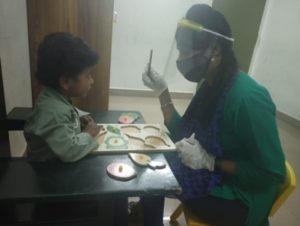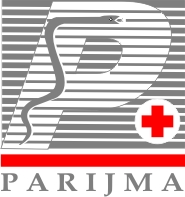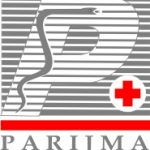What Is Speech Therapy?
Speech therapy is a specialized rehabilitative therapy that is done to improve the speech and language skills of children and adults.These include articulation therapy, language intervention activities, and others depending on the type of speech or language disorder.
Speech therapy may be needed for speech disorders that develop in childhood or speech impairments in adults caused by an injury or illness, such as stroke or brain injury.
Who needs speech therapy ?
Children & adults with the following speech and language disorders can be treated with speech therapy.
- Articulation disorders. An articulation disorder is the inability to properly form certain word sounds. A child with this speech disorder may drop, swap, distort, or add word sounds. An example of distorting a word would be saying “thith” instead of “this”.
- Fluency disorders. A fluency disorder affects the flow, speed, and rhythm of speech. Stuttering and cluttering are fluency disorders. A person with stuttering has trouble getting out a sound and may have speech that is blocked or interrupted, or may repeat part or all of a word.
- Resonance disorders. A resonance disorder occurs when a blockage or obstruction of regular airflow in the nasal or oral cavities alters the vibrations responsible for voice quality.They are often associated with cleft palate, neurological disorders, and swollen tonsils.
- Receptive disorders. A person with receptive language disorder has trouble understanding and processing what others say. This can cause him to seem uninterested when someone is speaking, Autism, hearing loss, and a head injury can lead to a receptive language disorder.
- Expressive disorders. Expressive language disorder is difficulty conveying or expressing information. It’s associated with developmental impairments, such as Down syndrome and hearing loss. It can also result from head trauma or a neurological condition.
- Cognitive-communication disorders. Difficulty communicating because of an injury to the part of the brain that controls your ability to think is referred to as cognitive-communication disorder. It can result in memory issues, problem solving, and difficulty speaking, or listening.
- Aphasia. This is an acquired communication disorder that affects a person’s ability to speak and understand others. It also often affects a person’s ability to read and write. Stroke is the most common cause of aphasia.
- Dysarthria. This condition is characterized by slow or slurred speech due to a weakness or inability to control the muscles used for speech. It’s most commonly caused by nervous system disorders and conditions that cause facial paralysis or throat and tongue weakness, such as multiple sclerosis (MS), amyotrophic lateral sclerosis (ALS), and stroke.
What happens during speech therapy?
Speech therapy usually begins with an assessment by a speech and language pathologist (SLP) who will identify the type of communication disorder and the best way to treat it.
Speech therapy for children :
For your child, speech therapy may take place in a classroom or small group, or one-on-one, depending on the speech disorder. Speech therapy exercises and activities vary depending on your child’s disorder, age, and needs. During speech therapy for children, the SLP may:
- interact through talking and playing, and using books, pictures other objects as part of language intervention to help stimulate language development
- model correct sounds and syllables for a child during age-appropriate play to teach the child how to make certain sounds
- provide strategies and homework for the child and parent or caregiver on how to do speech therapy at home
Speech therapy for adults :
Speech therapy for adults also begins with assessment to determine their needs and the best treatment. Speech therapy exercises for adults can help them with speech, language, and cognitive communication.
Therapy may also include retraining of swallowing function if an injury or medical condition, such as Parkinson’s disease or oral cancer has caused swallowing difficulties
How long do you need speech therapy?

The amount of time a person needs speech therapy depends on a few factors, including:
- their age
type and severity of the speech disorder
- frequency of therapy
- underlying medical condition
- treatment of an underlying medical condition
Some speech disorders begin in childhood and improve with age, while others continue into adulthood and require long-term therapy and maintenance.
What is unique about speech therapy training at Parijma?
Parijma Neurodiagnostic & Rehabilitation Centers is one of the oldest & most comprehensive multidisciplinary neuro-rehabilitation centers in the state with over 30years of trusted care
Each child and adult is individually assessed to determine his/her issues,area of strength & weakness and then a customized treatment and therapy plan is prepared in consultation with pediatric or adult neurologist,speech therapist and if needed, the clinical psychologist.This way,we focus on improving the areas of weakness and enhancing the areas of strength.This ensures maximal improvement in a relatively short time in most children & adults.

Which disorders need speech therapy :
- Autism
- Stuttering / Stammering
- Hypoxic ischemic encephalopathy
- Developmental delay
- Cerebral palsy
- Down’s syndrome
- Apraxia
- Aphasia
- ADHD
- Stroke
- Speech delay or dysfunction due to any other neuro developmental conditions.
IMPROV THERAPY
At Parijma,we have now, also started online neuro-rehabilitation therapy which also includes speech therapy and this can be done comfortably sitting at home. At parijma we can have effective therapy to help you andmake you/your child communicate with a lot more ease and lead a happy life ..

